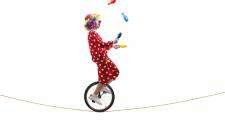The social worker who became a clown - and what it taught him

An Australian social worker has described how he became a clown in order to find better ways of approaching child protection work.
David Steggall says the process taught him vital lessons about approaches to failure, challenging impossible family ideals and the power of dissent in practice.
Stegall says he wanted to challenge the "narrow approach to child protection practice" he saw during his 11 years in the field.
He went through clown training, performing as a clown and in the process and discovering “correlations between clown and social work”.
Stegall said: "Failure is a dominant discourse in the child protection field: system failure, parents' failure to protect their children, young people's fail-to-thrive.
"Clowns also fail, and failure is the bedrock of much of clown practice.
"The clown-based social work practitioner accepts and unmasks their sense of failure and the impossibility of socio-political realities.
"They are open, vulnerable and willing, sharing every moment of failure, hope and discovery with the service user.
"The concept of inevitable failure is not complicit with parental actions that put children at risk of harm, but rather an acceptance of reality.”
In a paper titled Clown-based Social Work as Dissent in Child Protection Practice, Steggall and co-researcher Rebecca Scollen from the University of Southern Queensland, describe how clown theory "offers an alternative way of being with people in an impossible situation".
Two archetypal clowns informed the research: the Auguste clown – “incompetent at everything” – and the Whiteface clown who represents "self-importance, high status and sophistication".
Auguste and Whiteface expose the dynamics at the heart of power relationships: Whiteface represents "ridiculous authority" and bureaucracy; Auguste is "anti-authoritarian”, exposing rules as “ridiculous” and creating “space for criticism and reflection”.
Social workers, Steggall argues, fall prey to neoliberal "managerialism" that is “preoccupied with high caseloads, bureaucratic tasks, accountability, risk and the framing of individual blame for social problems".
But from a position of “shared vulnerability” learned from clown performance, he says social workers can enter “participatory dialogue with parents regarding their actions or inactions”.
The researchers conclude: “Clown practice offers an opportunity to stop, fail, share, accept, and carry on.”
